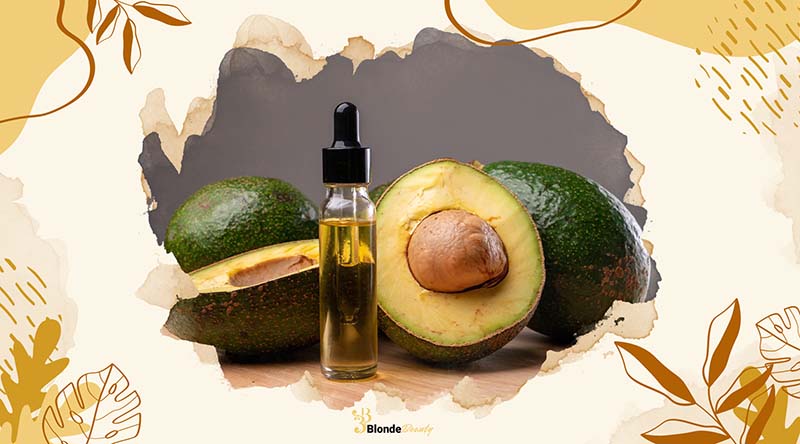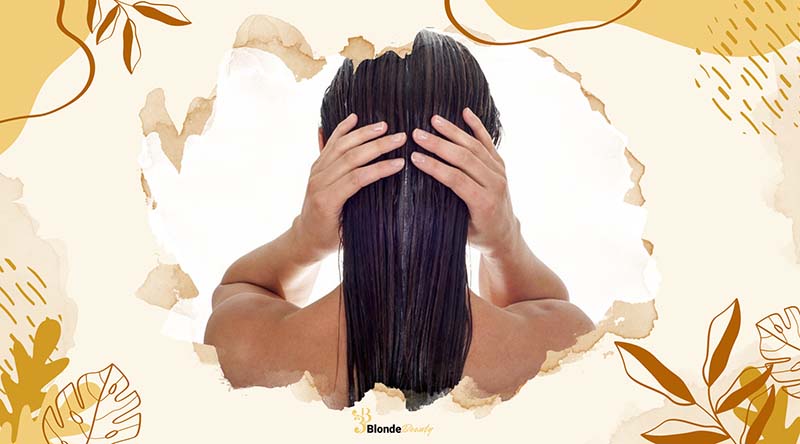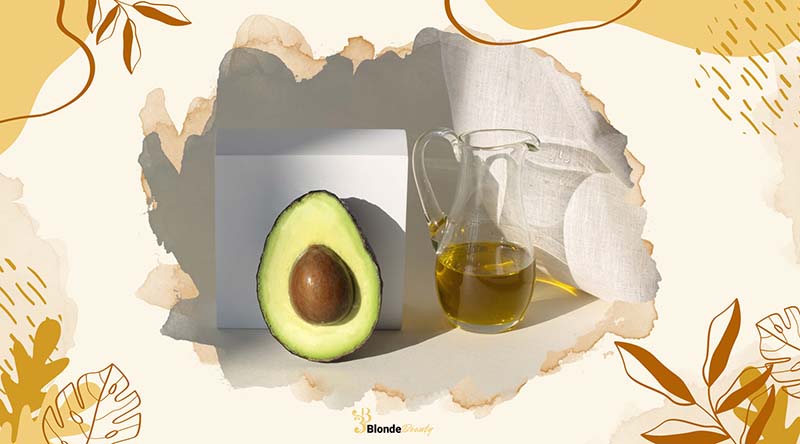Avocado oil has many benefits for hair, like reducing dandruff and preventing breakage.
Keeping your hair healthy with good hygiene can make it shiny and strong. Adding certain oils to your hair care routine can make your hair even healthier and smoother.
Is avocado oil good for your hair? In this article, we will look at the benefits of using avocado oil for hair care, show how to use it in hair masks or scalp massages, and talk about any possible risks.
Is Avocado Oil Good for Hair?
Yes, avocado oil is great for hair care. It’s packed with minerals like potassium and magnesium, vitamins like biotin, and antioxidants, making it a fantastic ingredient for hair health. Avocado oil helps to smooth, soften, and repair hair, retain moisture, boost shine, prevent breakage, and reduce flaking and dryness on the scalp.
This oil works well for various hair types and textures, especially for dry, thick, curly, or natural hair due to its ultra-moisturizing properties. While avocado oil doesn’t directly stimulate hair growth, it creates a healthy environment for optimal growth and protects the scalp to prevent excess shedding.

Avocado Oil Benefits for Hair
Avocado oil is rich in fatty acids, antioxidants, and other nutrients that are great for hair and skin, such as Vitamins A and E. Here are some notable benefits:
Avocado Oil Helps Condition Hair
Treating your hair with avocado oil can moisturize, repair, and strengthen your strands.
Avocados are rich in antioxidants, biotin, minerals, essential fatty acids, and vitamins A, B-5, and E. All these nutrients help seal the hair cuticle and prevent breakage.
Avocado Oil Penetrates the Hair at a Deeper Level
Avocados are praised for their non-greasy feel and ability to penetrate the hair and scalp. They are extremely rich in oleic acid and monounsaturated fats (good fats), making avocado oil one of the few oils that can actually penetrate the hair shaft and moisturize your hair, rather than just coating it.

Avocado Oil Helps Hair Grow Quickly
Avocados naturally contain biotin, a member of the vitamin B family believed to promote healthier, thicker, and longer hair, as well as circulation-promoting vitamin K.
These nutrients help create optimal conditions for hair growth. However, the only clinically proven product for hair growth is one containing minoxidil.
Avocado Oil Supports a Healthier Scalp
Avocado oil can stimulate blood flow to the scalp and unclog blocked follicles, creating a healthy scalp environment for hair growth.
This can also help fight hair loss. The combination of vitamins and lipids moisturizes and nourishes a dry, flaky scalp, reducing dandruff and flaking.
Avocado Oil Makes Hair Shinier
Studies have found that minerals in avocado oil, including potassium and magnesium, may seal cuticle cells, helping hair look smooth and shiny.
Avocado Oil Helps Protect Your Hair from External Factors
Carotenoid antioxidants, beta-carotene, and lutein are powerful antioxidants in avocado oil that help defend the scalp and hair against UV damage and pollutants.
Its antioxidant properties can protect hair against sun damage and other elements. Additionally, avocado polyphenols help shield both the scalp and hair from environmental aggressors.
Note:
- Always do a patch test before using new oils to avoid allergic reactions.
- Use cold-pressed, unrefined avocado oil for the best results because it retains more nutrients.
- Mixing avocado oil with essential oils like rosemary or peppermint can boost its benefits.
How to Use Avocado Oil on Hair Effectively
There are several ways to apply avocado oil to your hair or scalp. You can find avocado oil in supermarkets, health shops, or online stores. Using avocado oil in the following ways may benefit your hair:
1. Scalp Massage
Massaging oils into the scalp can help treat a dry, flaky scalp and prevent dandruff if done regularly.
How to massage the scalp:
- Warm a small amount of oil in a bowl by placing it in a jug of hot water or microwaving it for a few seconds.
- Gently separate the hair and apply a little oil to the scalp using your fingertips or a cotton ball.
- Massage the oil into the scalp using small, circular motions with your fingertips.
- Leave the oil on the scalp for a short while to absorb before rinsing it out using your usual shampoo routine.
2. Hair Mask
Using mashed avocado as a hair mask can help lubricate the hair, making it appear shinier and healthier.
How to make an avocado hair mask:
- Remove the stone and peel from an avocado, and mash half of it in a bowl.
- Add 1 egg yolk and 1 tablespoon of honey.
- Combine the ingredients.
- Apply to clean, damp hair and leave for 30 minutes.
- Rinse your hair thoroughly and dry.
This treatment can be used once every two weeks if needed.

3. Conditioner
Avocado oil can be used as an intensive conditioner, especially beneficial for dry or damaged hair, after washing with shampoos that can dry out your hair.
How to use avocado oil as a conditioner:
- After washing your hair with shampoo, apply a small amount of avocado oil to your fingers.
- Run your fingers through your hair from root to tip, repeating as needed to coat your hair with oil.
- Leave the avocado oil on your hair for a short time, then rinse it out with warm water.
Who Can Use Avocado Oil on Hair?
Avocado oil is suitable for all hair types because it penetrates deeply into the scalp and hair shaft, making it an excellent treatment for damaged hair. However, there are some considerations to keep in mind:
- All Hair Types: Avocado oil works well for all hair types, including dry, thick, curly, and natural hair, due to its moisturizing properties.
- Damaged Hair: It is particularly beneficial for repairing and strengthening damaged hair.
- Fine Hair: If you have fine hair, use a very small amount and only apply it to the lengths of your hair to avoid weighing it down.
- Avocado Allergy: People with an avocado allergy should not use avocado oil on their hair.
Can I Use Avocado Oil on My Hair Overnight?
Yes, you can use avocado oil on your hair overnight. Avocado oil is rich in vitamins, antioxidants, and essential fatty acids that promote hair health. By applying it overnight, you allow the oil to deeply penetrate the hair shaft, providing intense hydration and helping to repair damage.
How to use avocado oil overnight:
- Apply the oil: Distribute a small amount of avocado oil evenly through your hair, focusing on the ends and any damaged areas.
- Cover your hair: Use a shower cap or wrap your hair in a towel to prevent oil transfer to your bedding.
- Rinse and shampoo: In the morning, thoroughly rinse and shampoo your hair to remove the oil residue.
Tips:
- If you’re not sure how your hair will react to an overnight oil treatment, test this method on a small section of hair before applying it all over.
- Always do a patch test to avoid allergic reactions.
- Use cold-pressed, unrefined avocado oil for the best results, as it retains more nutrients.
Risks of Using Avocado Oil for Hair
Using avocado oil for hair care has many benefits, but there are also some potential risks to be aware of:
- Allergic Reactions: If you have an allergy or sensitivity to avocados, avoid using avocado oil internally or topically, as it may cause an allergic reaction. Always do a patch test on a small area of skin before applying avocado oil to your hair and scalp to check for any adverse reactions.
- Greasiness: Using too much avocado oil can leave your hair feeling greasy. If this happens, wash it out thoroughly with a gentle shampoo until the excess oil is removed.
- Limitations: While avocado oil can help prevent further breakage by lubricating the hair strands, it cannot reverse major damage caused by bleaching, heat treatments, or relaxing the hair. It is not a cure for severe hair damage.
FAQs
Is Avocado Oil Good for Low Porosity Hair?
Yes, avocado oil is great for almost every hair type due to its light, fast-absorbing nature, making it especially effective for medium/low porosity and medium/low density hair.
How to Use Avocado and Egg for Hair Growth?
Egg yolks, not egg whites, promote hair growth. Whisk the egg to a frothy liquid, stir in coconut oil, and add mashed avocado.
Apply the mask to towel-dried hair from roots to ends, cover with a plastic cap, and let it sit for 10 to 20 minutes. Shampoo and condition as usual with lukewarm or cool water. When dry, your hair should feel strong and moisturized.
Conclusion
So “is avocado oil good for your hair?” Hair grows from the hair shaft, where it can absorb nutrients, emphasizing the importance of a nutritious diet for maintaining healthy hair. Incorporating avocado oil into your cooking as part of a balanced diet may help keep your hair hydrated.
To foster healthy hair, ensure you eat well, drink plenty of fluids, and get enough sleep. Regular washing, drying, and trimming of split ends are fundamental for hair care. Additionally, using avocado oil as a hair mask or conditioner can make your hair appear shinier and healthier.
For more insightful articles on health and wellness, be sure to explore additional blogs from Blonde Beauty.

Laureate Professor Clare Collins
Professor Clare Collins is a leading expert in nutrition and dietetics at the School of Health Sciences, part of the College of Health, Medicine and Wellbeing. Her work is changing the way we think about food and health. She grew up as one of nine children and was the first in her family to finish high school and go to college. This background gave her a strong work ethic and a deep appreciation for seizing opportunities.
As the Director of the Hunter Medical Research Institute’s Food and Nutrition Program and a recipient of three NHMRC Research Fellowships, Professor Collins is making a big difference in public health. She focuses on helping people who are often overlooked, using new technologies like apps and online programs to improve their nutrition and reduce the risk of chronic diseases.
Professor Collins is well-respected and has been recognized as a Fellow in four major health and science organizations. She leads a diverse team of experts, including dietitians, computer scientists, and engineers, working together on global health projects.
Her achievements are impressive. She has received over $29 million in research funding, published more than 450 papers, and helped 35 PhD and Master’s students complete their degrees. She’s also active in sharing her knowledge with the public. She has developed tools like the Australian Eating Survey and the Healthy Eating Quiz, and she often appears in the media to talk about nutrition.
PUBLISHED ARTICLES
- Collins, C. (2019). “The Effect of a Pilot Dietary Intervention on Pain Outcomes in Patients Attending a Tertiary Pain Service.”
- Collins, C. (2022). “Variation in cardiovascular disease risk factors among older adults.”
- Collins, C. (2022). “Evaluation of an online intervention for improving stroke survivors’ health-related quality of life: A randomised controlled trial.”
These articles show Professor Collins’s commitment to understanding how better nutrition can improve health. Her work is important for researchers, doctors, and anyone interested in healthy living.
